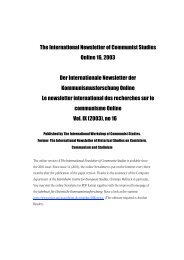Vol. XIII (2007), no 20 - The International Newsletter of Communist ...
Vol. XIII (2007), no 20 - The International Newsletter of Communist ...
Vol. XIII (2007), no 20 - The International Newsletter of Communist ...
Erfolgreiche ePaper selbst erstellen
Machen Sie aus Ihren PDF Publikationen ein blätterbares Flipbook mit unserer einzigartigen Google optimierten e-Paper Software.
<strong>The</strong> <strong>International</strong> Newletter <strong>of</strong> <strong>Communist</strong> Studies Online <strong>XIII</strong> (<strong><strong>20</strong>07</strong>), <strong>no</strong> <strong>20</strong> 127<br />
Renkama, Jukka: Ideology and Challenge <strong>of</strong> Political Liberalisation in the<br />
USSR. 1957-1961. Otto Kuusinen's "Reform Platform", the State Concept<br />
and the Path to the 3rd CPSU Programme, Helsinki, SKS, <strong>20</strong>06. 396 p.<br />
(Reviewed by Tau<strong>no</strong> Saarela, Helsinki).<br />
Otto Ville Kuusinen’s reputation as a significant international and Soviet politician was based<br />
on his activities as secretary <strong>of</strong> the <strong>Communist</strong> <strong>International</strong> in 1921-39 and as member <strong>of</strong> the<br />
leadership <strong>of</strong> the <strong>Communist</strong> Party <strong>of</strong> the Soviet Union (CPSU) from the end <strong>of</strong> the 1950s to<br />
the beginning <strong>of</strong> the 1960s.<br />
In his recent dissertation, Jukka Renkama has studied the later phase, during which<br />
Kuusinen tried to liberalise the ideological stands <strong>of</strong> the CPSU. His contributions to that<br />
liberalisation consisted <strong>of</strong> some proposals concerning the <strong>no</strong>tion <strong>of</strong> the "dictatorship <strong>of</strong> the<br />
proletariat" in 1957 and also the programme <strong>of</strong> the CPSU in 1961. During that time he was<br />
involved in editing the book <strong>The</strong> Fundamentals <strong>of</strong> Marxism-Leninism. <strong>The</strong> effort <strong>of</strong><br />
liberalisation concerned mainly the question <strong>of</strong> how the state could be characterised in the<br />
Soviet Union in the late 1950s. Kuusinen still shared the opinion that the communists, after<br />
the take-over <strong>of</strong> the power, had to establish a dictatorship <strong>of</strong> the proletariat, but he did <strong>no</strong>t<br />
want to say that there existed a dictatorship <strong>of</strong> the proletariat in the Soviet Union. This<br />
choice was guided by the wish to express a vast support <strong>of</strong> socialism in the Soviet Union but<br />
also by the fear <strong>of</strong> recurrence <strong>of</strong> the violent past.<br />
Renkama’s book is an excellent study in the history <strong>of</strong> ideas. It consists mainly <strong>of</strong> the<br />
comparison <strong>of</strong> various ideas and concepts. Renkama performs that comparison very well, but<br />
it might have been possible to pay more attention to the situation in which the texts were<br />
written. To speak about the character <strong>of</strong> the state was <strong>no</strong>t the same issue for those who<br />
reached out for power as for those who already held the power, that is, it was <strong>no</strong>t the same<br />
issue for Marx and Engels as it was for Kuusinen in the 1950s. Considering this would have<br />
given some possibilities to the author to shorten and combine the analysis <strong>of</strong> various concepts<br />
and ideas.<br />
Renkama relates Kuusinen’s thinking to other contemporary proposals by studying the<br />
programmatic texts written in Hungary, Yugoslavia and China. Thus he aptly reveals the<br />
internationalism <strong>of</strong> the communist movement. That internationalism would also have given<br />
reasons to ponder on the possible challenge the Western communist parties posed the CPSU<br />
after the Hungarian events in 1956, in particular.<br />
Renkama does <strong>no</strong>t consider Kuusinen and the other communists as almighty as that he would<br />
<strong>no</strong>t dare to consider the inherent contradictions in their thinking. Kuusinen, for instance,<br />
opted for the development <strong>of</strong> a self-government but on the other hand considered selfevident<br />
that the communist party continues to have a leading position. <strong>The</strong> analysis <strong>of</strong><br />
contradictions deriving from that is carried out in an excellent way.<br />
Renkama brings up the questions concerning the relationship between general ideological<br />
statements and the practical political and eco<strong>no</strong>mic issues. For instance, the idea that<br />
capitalist countries were to attack socialist countries could be a reason to argue for strong














